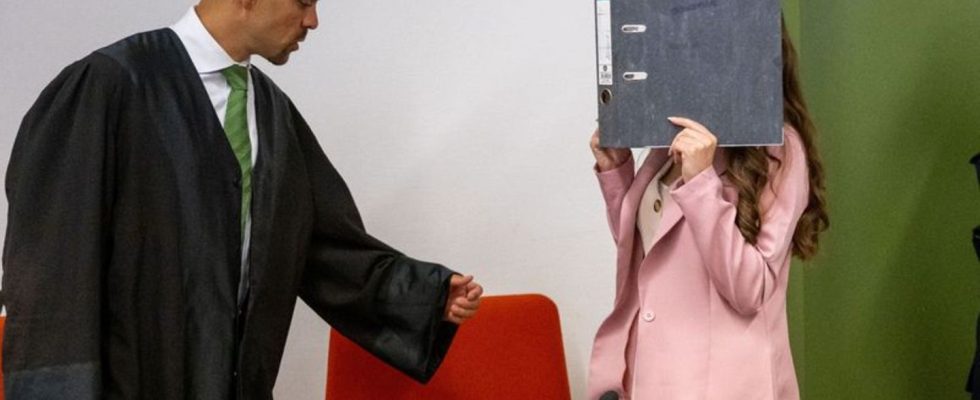In her first trial in Munich two years ago, Jennifer W. was largely silent. Now the IS returnee has a new defense strategy and is verbose and sobbing.
“I’m sorry, I’m really sorry,” says Jennifer W. The young woman fought back tears on Monday before the Higher Regional Court (OLG) in Munich. She uses the last word she is entitled to as a defendant to explain herself very verbosely and for minutes. “I know that I absolutely cannot make up for it and that you cannot turn back time.”
The trial against the now 32-year-old for the horrible death of a little Yazidi girl in Iraq is drawing to a close before the Higher Regional Court. The federal prosecutor is demanding a significantly higher prison sentence for the IS returnee. Federal prosecutor Jochen Weingarten speaks out on Monday before the Higher Regional Court (OLG) in Munich for a prison sentence of 14 years and six months. That is four and a half years more than what the Higher Regional Court imposed in October 2021.
The young woman from Lohne in Lower Saxony had been sentenced to ten years in prison – including for crimes against humanity through enslavement resulting in death in a minor case. She had admitted in court to watching a Yazidi girl enslaved by her and her husband die chained by the man in the blazing midday sun.
New trial, more confessions
The Federal Court of Justice (BGH) in Karlsruhe doubted that the case was less serious and referred the case back to another Senate of the Higher Regional Court for a new hearing on the sentence. In the new trial, the defendant also admitted to holding a gun to the head of the girl’s mother, who was also enslaved, because she wanted her to stop crying over her killed child.
This is “certainly not a less serious case,” says Weingarten in his plea, which is also joined by the joint prosecutor, without filing a specific criminal complaint themselves. She “proactively designed slavery” that oversees the woman and her young daughter. “She arranged the forced labor herself,” says the federal prosecutor.
And she didn’t help the little girl for fear her husband might yell at her or even push her, even though she could have expected it. “She knew that the child would suffer,” the plea said. “The driving force behind action is selfish convenience.”
Cruel brutality
It’s an “extraordinary case,” says attorney Wolfgang Bendler, who is representing the mother of the dead girl in court. It is about genocide and “cruel brutality against a defenseless child”. “She can’t forgive,” says Bendler, quoting the mother: “You killed my child in front of my eyes. I won’t accept that.”
The accused says: “It doesn’t come across as if my remorse is really honest.” She couldn’t put it into words, says W., who had largely remained silent in her first trial before the OLG, in her last word and sobs. She would like to offer the woman, who was kept as a slave for weeks by the accused and her husband, an IS supporter, financial support – “as soon as I can.”
She wishes the woman that she now feels safe in Germany. “I just wish for her future that she manages to lead a normal life, at least partially, with therapies,” said the accused. “I don’t think that’s possible, but I wish her from the bottom of my heart that somehow she manages to start over with her son.”
Allegedly for fear of punishment
She “behaved incorrectly in the previous proceedings,” says the 32-year-old, who herself is the mother of a daughter. “I just didn’t want to admit it.” She was afraid of the punishment, but now she wants to stand by what she did. It’s “probably the first time in my life that I’ve ever taken responsibility, and I’m sorry it’s coming so late.”
But she also emphasizes that she did not help the child at the time for fear of her abusive husband – and that she was doing very poorly in prison and was hostile to her. She wonders “what is the point of my life because everyone hates me”. “Of course I have to get a penalty, I understand that too, but I don’t know how I’m going to do it.”
In his plea, her lawyer demands that the court should stay with the originally imposed ten years of imprisonment. The verdict is expected on Tuesday next week.

